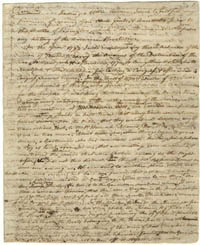Collections Online
Letter from Paul Revere to Jeremy Belknap, circa 1798
To order an image, navigate to the full
display and click "request this image"
on the blue toolbar.
-
Choose an alternate description of this item written for these projects:
- Witness to America's Past
- MHS Collecting History
- MHS 225th Anniversary
In this undated letter, written at the request of Jeremy Belknap, corresponding secretary of the Massachusetts Historical Society, Paul Revere summarizes his activities on 18-19 April 1775: he recounts how Dr. Joseph Warren urged him to ride to Lexington (to warn John Hancock and Samuel Adams of British troop movements); how he had previously arranged with some fellow Patriots to signal the direction of those movements by placing signal lanterns in the steeple of Old North Church; and how he left Boston from the "North part of the Town," was rowed across the Charles River by two friends, and there borrowed a horse and began his ride.
The manuscript letter includes some interlineations, apparently in the hand of Jeremy Belknap. In printing the account in Collections of the Massachusetts Historical Society, 1st series, vol. 5 (1798), Belknap assigned to it the date of 1 January 1798. At the end of the document, Revere signed his name but then, apparently choosing to remain anonymous, wrote above it "A Son of Liberty of the year 1775" and beside it "do not print my name." Either he changed his mind or Belknap ignored his request, for the two phrases are crossed out in the original document, and the name is included in the printed version.
Revere fills most pages of his letter to Belknap (pages 2-6) with the description of his ride. He writes of avoiding British soldiers and reaching Lexington, where he conveyed information to Hancock and Adams and where he met up with William Dawes. After Revere and Dawes set off for Concord, they were joined by Samuel Prescott, who helped them "allarm all the Inhabitents." Revere's ride ended when he was captured by British soldiers, interrogated, and eventually released in Lexington in time to hear the opening shots of the Revolutionary War.
It is interesting to compare this letter to the deposition Paul Revere wrote probably in response to a request from the Massachusetts Provincial Congress (see Paul Revere's deposition, fair copy, circa 1775; and Paul Revere's deposition, draft, circa 1775). Though fuller in some details and less detailed in others, the substance of the letter does not differ materially from Revere's account of his ride to Lexington in the earlier deposition.

